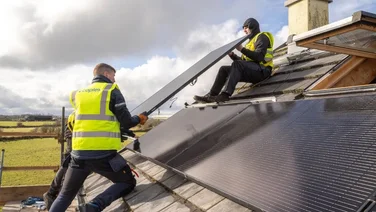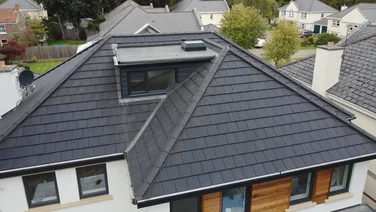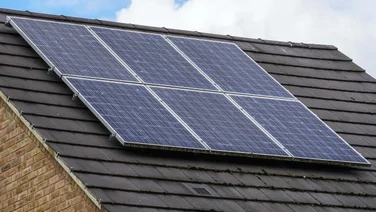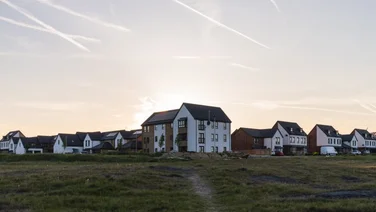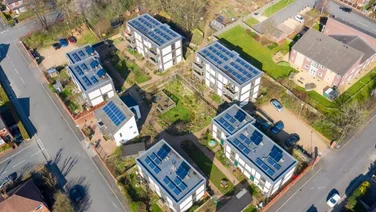- How did we choose the best solar panels?
- SunPower Maxeon 6 AC - best for most homes
- AIKO N-Type ABC White Hole Series (72 Cells) - best for efficiency
- Seraphim SRP-670-BMC-BG - best for large households
- Project Solar Evo Super Max 455 - best warranty
- SunPower Maxeon 3 - best for reliable performance
- Q Cells Q.Peak DUO BLK ML-G9 - best for warm locations
- Panasonic HIT N340 - best for delicate roofs
- Panasonic EverVolt EVPV410H - most eco-friendly
- LONGi Hi-MO X6 Explorer 435W – best looking
- How do I know which are the best solar panels for my home?
- Price
- Can you choose which panels you get?
- Next steps
- We tested the top 50 solar panels on the UK market
- Rated them against 7 key criteria
- Looked at things like power, efficiency, warranties and appearance
- Picked the 9 best solar panels available in the UK today
- Read our guide before investing in solar panels for your home
Choosing the best solar panels for your home, energy needs and budget will help to ensure that you make the most of your investment in solar. But with so many solar panel price points, brands and types available, the choice can feel daunting.
We’re here to help. Our team of researchers spent 34 hours analysing 48 solar panels from the UK’s 17 top solar companies, and compared them on key factors including power, efficiency and warranty.
In this article, we’ll reveal our researchers’ findings, explain the key measures they used, and explore what they mean for you. For example, solar panels with the highest power ratings are ideal for large households, while more efficient panels are a better choice for small roofs and homes that don’t get much sunlight.
We’ll offer more guidance on choosing the best solar panels for you in our buyers’ guide, below. First, we’ll reveal the nine solar panels that came top in our thorough product analysis, and explain why each panel might be the best choice for your home.
Once you have a good idea of the type of solar panel you want, it’s time to collect a few quotes. Fill in our form, and our hand-picked selection of solar installers will be in touch. Read our guide on solar panel financing to get a better idea of how that side of it works.
It’s also worth checking our articles on how many panels you need and solar panel costs so you’re armed with the right information when discussing quotes.

How did we choose the best solar panels?
After analysing each panel’s specifications, we determined the nine best solar panels and gave them a rating out of five across each of these key criteria:
- Power
- Efficiency
- Product warranty
- Performance warranty
- Heat resistance
- Eco-friendly credentials
- Appearance
You can see a further explanation of these factors below the reviews.
SunPower Maxeon 6 AC – best for most homes

The SunPower Maxeon 6 AC has a 40-year product warranty (SunPower)
The SunPower Maxeon 6 AC is the best all-rounder in our test. It excels in the key areas of efficiency and warranty, and also performs well on power, heat resistance and eco-friendliness.
The panel’s efficiency rating puts it in the top 10% of all those we tested, enabling it to make the most of limited sunlight. It won’t lose too much efficiency as it ages, either: SunPower promises it’ll produce at least 88.25% of its original output after 40 years.
When this panel does eventually reach the end of its useful life, SunPower even promises to recycle it.
- Its 40 year product warranty is one of the best available
- At 22.8%, it has one of the best efficiency rates on the market
- It is quite heavy, and you should take that into account before you buy it
AIKO N-Type ABC White Hole Series (72 Cells) – best for efficiency

The ABC White Hole Series has a landmark 24% efficiency rating (AIKO)
The 24% efficiency rate of AIKO’s powerful 72-cell N-Type ABC White Hole Series panel is a new best for domestic solar panels, which struggled to get above 20% a few years ago.
This makes the AIKO panel a great choice if your roof space is limited, or you don’t get much sunlight.
AIKO also offers an excellent performance warranty, promising at least 88.85% of original output after 30 years. The product warranty lets the side down, though.
- Its 24% efficiency rate is the best on the market
- It has one of the best performance warranties at 88.85%
- Its peak power rating of 620W is one of the best available
- It is one of the biggest and heaviest panels we tested
- Its 15-year product warranty is at the low end
Seraphim SRP-670-BMC-BG – best for large households

This panel’s peak power production is 91% more than the standard (Seraphim)
The Seraphim SRP-670-BMC-BG’s peak power rating is almost double the industry standard of 350W per panel, and at least 100W more than most of the panels we considered for testing.
Such a mighty power output won’t be necessary for all homes, but could be ideal if you have a large household with big energy needs. Just make sure your roof is up to supporting panels that weigh 38.5 kg and measure 3.1 square metres each.
- At 670W, it has fantastic peak power production
- Its efficiency rating of 21.57% is better than average
- The product warranty is a mere 15 years
- The performance warranty of 84.95% after 30 years could be better
- This huge, heavy panel weighs 38.5kg
Project Solar Evo Super Max 455 – best warranty

This panel’s lifetime warranty is industry-leading (Project Solar)
The average product warranty for a solar panel is 25 years, and some stretch to 40 – but Project Solar outdoes them all with a lifetime warranty for its Evo Super Max 455. That’s the kind of confidence you want from a manufacturer.
This panel’s efficiency and power are both near the top end of our tests, too, so you can be sure you’ll get an above-average electricity output.
- Lifetime product warranty is unbeatable
- Its peak power production of 455W is above average
- Efficiency is also at the top end of the market, at 21.1%
- Heat resistance could be better
- The panel is bigger and heavier than average
SunPower Maxeon 3 – best for reliable performance

This panel will function at 92% after 25 years (SunPower)
SunPower promises that the highly efficient Maxeon 3 will remain productive for decades on end. Thanks to its market-leading performance warranty, you’re guaranteed 92% of original output after 25 years, and 88.25% after 40 years.
With some manufacturers in our test reluctant to promise much more than 80% of output after 25 years, SunPower’s confidence in its recycled panels is reassuring.
- The best performance warranty in our tests
- Great product warranty suggests these panels are durable as well as reliable
- High efficiency rating of 22.7%, near the top of the range
- The panel is small but relatively heavy
Q Cells Q.Peak DUO BLK ML-G9 – best for warm locations

Losing only -0.25% for every degree above 25°C is fantastic (Q Cells)
Q Cells’ panel is unusually good at coping in the heat. The panel loses just 0.25% of its efficiency with every degree over 25°C, compared with 0.34% or more by nearly 80% of the panels in our test.
With heatwaves getting more common, it will become more and more important to invest in panels that don’t flag as the mercury rises – and continue to work well for years. Sadly, Q Cells’ product warranty of just 12 years is well below average.
- Unbeatable resistance to heat
- One of the smallest and lightest panels on the market, at under 20kg
- Poor product warranty of 12 years
- No eco-friendly credentials
Panasonic HIT N340 – best for delicate roofs

The HIT N340 is lighter and smaller than the average panel (Panasonic)
Panasonic’s HIT N340 weighs in at well below the 22.4 kg industry average, and takes up a modest 1.7 square metres of space, compared with the usual 2 metres. The panel is less powerful than its heavier rivals, but its light weight makes it a wise choice if your roof is fragile or unusually shaped.
The HIT N340’s heat resistance and warranties are also excellent, as are Panasonic’s eco credentials.
The brand has a detailed plan to reach net-zero emissions by 2030, with steps including investing in hydrogen and creating net-zero factories.
- The lightest panel on the market
- Excellent eco-friendly credentials, including net zero by 2030
- Top-quality heat resistance
- Below-average power
- 20.3% efficiency rating is at the low end in our tests
Panasonic EverVolt EVPV410H – most eco-friendly

Panasonic has pledged to reach net-zero by 2030 (Panasonic)
The EverVolt Series Module is a solid all-rounder, scoring high in our tests for efficiency, heat resistance and light weight, plus an excellent performance warranty.
As mentioned above, Panasonic has a detailed plan to reach net-zero emissions by 2030, with steps including investing in hydrogen and creating net-zero factories.
- Excellent eco-friendly credentials, including net zero by 2030
- Great efficiency rating of 22.2%
- Superb performance warranty
- Middling power rating of 410W
LONGi Hi-MO X6 Explorer 435W – best looking

LONGi’s sleek black panels will turn heads (LONGi)
Chinese solar giant LONGi has created a solar panel that could make the cover of Vogue, and it’s no slouch when it comes to performance and efficiency.
The sleek black Hi-MO X6 Explorer will add a modern flourish to your home, but because the panels are subtle and relatively small, people may not even notice them at all.
The 435W Hi-MO X6 isn’t the most powerful panel in our rundown, but its 22.3% efficiency rating means it’ll make the most of any sun it gets. Its above-average performance warranty means it’s guaranteed to deliver for decades, too.
- Sleek black appearance
- Works well on dull days, thanks to an excellent 22.3% efficiency rating
- Good performance warranty promises 88.9% output after 25 years
- LONGi aims to use green energy for all its operations by 2028
- Product warranty is below average at just 15 years
Key solar panel criteria explained
Here are the key factors that helped us narrow down our selection, first to the top 48 models and then to the nine best:
- Power – Measured in watts (W), power refers to a solar panel’s peak energy production in standard test conditions. A 300W panel would produce 1,500 watt-hours (1.5kWh) of electricity in five hours. In 2024, the best residential solar panels have power ratings of between 400W and a hefty 670W.
- Efficiency – Efficiency refers to the percentage of sunlight hitting a solar panel that can be converted into usable electricity.
- Product warranty – Solar panel warranties usually range from 10 years all the way up to 40 years – or even a lifetime warranty, if you opt for the Project Solar Evo Super Max 455.
- Performance warranty – The performance warranty guarantees that your panel will produce a certain percentage of its original output for a number of years. This is typically 80-90% after 25-30 years. Today’s best panels produce as much as 92% of their original output after 25 years.
- Heat resistance – A solar panel’s heat resistance score refers to the percentage decrease in output that occurs with every extra degree above 25°C. Most panels lose between 0.3% and 0.4% per degree above 25°C, but the best entry on our list drops just 0.25%.
- Eco-friendly credentials – We looked into companies’ overall green actions. We then ranked these actions based on their impacts on the environment, from the brand trying to reach net-zero to those doing nothing to stop the ongoing climate disaster.
- Appearance – Panels are getting darker and sleeker, with the latest premium monocrystalline ones looking like panes of glass.
Another factor that we didn’t measure for all panels was weight. The typical three-bedroom house needs 10 solar panels to cover its electricity usage, so if your roof is old or delicate, it may not be able to hold the biggest and heaviest panels.
This makes lightweight, efficient panels an important alternative for anyone with a less reliable roof.
How do I know which are the best solar panels for my home?
Our nine best solar panels are all excellent products, but the one that’s right for you depends on your own circumstances.
Your household energy usage is the most important factor when discussing your panel choices with your installer. If you want to cover as much as your energy needs as possible, especially if you have a large family, the most powerful solar panels may be your best choice – provided your roof is sturdy enough (you might want to invest in a storage battery, too).
If your roof isn’t quite up to the job, or it faces north or west, or it’s overshadowed by trees or tall buildings, then efficiency should be your priority. Solar panels with high efficiency ratings can generate lots of electricity from minimal sunlight, or with a smaller solar array.
Also consider your future energy needs. Do you plan to buy an electric vehicle (EV) at some point? If so, talk to your installer about investing in a solar panel system that includes an EV-compatible solar battery.
Start your search by comparing quotes and speaking to at least three installers about the panels they can supply, how much they will cost, and what will work best for your home.
To get a rough idea of costs, you can use our solar panel cost calculator.
Price
There’s one big factor we haven’t discussed yet: price.
We’ve not given individual prices for our recommended solar panels, because prices differ depending on where you buy. Unless you’re planning a DIY project, you will almost certainly buy through an installer, and they will add their own installation costs and trade discounts.
Rather than price up individual panels, it’s more useful to cost the whole system, installation included. The cost of your solar panel system will depend on numerous factors, including:
- The size and shape of your roof
- Your home’s location in the UK
- The number and type of panels you need
Your installer will work with you to answer those questions. They will also make recommendations for panels and other solar components based on:
- Your household’s size and energy needs
- Your current electricity usage, and how much of the bill you want to cover using solar power
- Your budget
Want to learn more? Head to our solar panel cost page.
Can you choose which panels you get?
You’ll have a limited say over which solar panels you get for your home.
Typically, you’ll approach multiple solar installers, who’ll provide you with quotes that include one of the models they use.
You can (and should) ask about the other panels they buy wholesale, and talk through the models’ respective strengths and weaknesses.
But an installer will almost never buy a set of solar panels just for your property, so your choice will be restricted to the panels used by installers who serve your area.
For more in-depth information, read our guide to The best solar panel installers.
Next steps
By now, you’ll know all about the best of the best when it comes to the solar industry, from panels and companies to exciting new technology.
And you have great timing, with 60% of UK residents currently wanting to switch to renewable energy, according to our latest National Home Energy Survey.
If you’ve decided to get solar panels, the next step is finding the right deal – that’s where we come in.
Simply pop your details on this free form and let us take the reins. We’ll pass on your details to our professional installers, who will then get in touch with their best prices.
From there, you can discuss the best solar PV system for your house with qualified people who’ve got the know-how.


